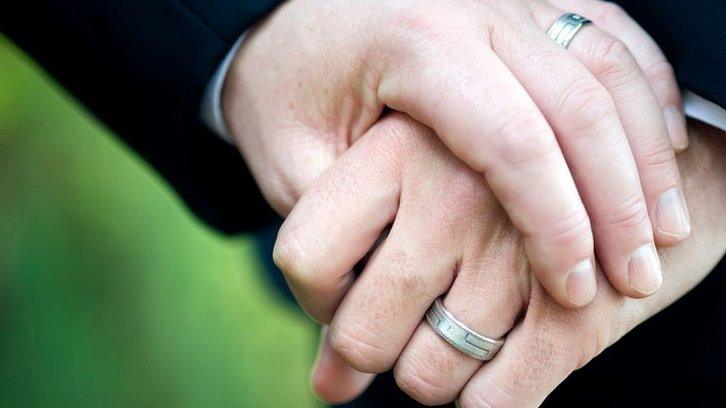Gay weddings: 'Fifth of Britons would turn down invitation'
- Published
- comments
Gay marriage will be legalised at midnight in England and Wales
About one in five British adults would turn down an invitation to a same-sex wedding, research suggests.
As legislation in England and Wales allowing gay couples to marry comes into force on Saturday, the BBC Radio 5 live survey also found men were nearly twice as likely to stay away as women.
The poll of 1,007 people found 68% agreed gay marriage should be permitted, with 26% opposing it.
One gay rights charity said people's attitudes were "incredibly positive".
A spokesman for lesbian, gay and bisexual charity Stonewall said it was important to highlight the fact that four in five people would accept an invitation to a gay wedding.
Man tells BBC Radio 5 live: "I wouldn't go if I was invited"
'Bigoted or intolerant'
But Catholic Voices, which represents the Catholic Church, said the findings of the survey reflected the reality that people remained "deeply uncomfortable" with being honest about their true feelings on the meaning of marriage.
Father Edmund Montgomery, a member of the organisation and a Catholic priest in Greater Manchester, said: "As the Church, we love those seeking a same-sex union, but our love for them requires we tell them the true meaning of marriage, something which that fifth of respondents find difficult but have the integrity to do by turning down the invitation.
"In our modern culture it is increasingly difficult to have an open debate without being labelled as bigoted or intolerant."
He continued: "It is a great irony that those seeking to increase tolerance do not extend that to those who disagree with them."
Fr Montgomery, who at 29 is the youngest priest in the diocese of Shrewsbury, said he thought more people might turn down an invitation to a gay wedding were they not concerned they might be regarded as extreme.
He added that, as marriage predates "the State", it should not be the government's place to change its meaning.
With same-sex weddings in England and Wales permitted for the first time from Saturday, the research suggested a substantial proportion of the population had reservations about the issue - with 42% disagreeing that gay marriages were no different from heterosexual marriages.
Of the 1,007 British adults polled by ComRes for the Stephen Nolan Show, 22% said they would spurn an invitation to attend a same-sex wedding ceremony.
'Landmark moment'
Some 29% of men asked said they would not attend, compared with 16% of women.
The research also found that younger people were more likely to support same-sex marriage, with 80% of 18 to 34-year-olds backing it, compared with 44% of over-65s.
Of those polled, women were more likely to support gay marriage than men, with 75% of women for it compared with 61% of men in favour.
A majority of 59% of people asked agreed a person should not be considered homophobic for opposing the legislation permitting gay marriage.
Stonewall said the organisation recognised that not everyone would support same-sex marriage, but that the legislation permitting it should not affect them.
"Same-sex couples are living in committed, loving relationships and people have realised that the sky has not fallen in," the spokesman said.
He said the prevalence of civil partnerships had been an "incredibly important factor" in paving the way for same-sex marriage.
"This is a landmark moment and for the first time ever, someone young growing up knowing they are gay can have the exact same avenues open to them, [and know] that their relationship will be valued the same way their parents' was," the spokesman said.
"As campaigners and MPs have said in the past, the first thing a parent says to their son or daughter when they tell them they are gay is, 'Oh, you'll never be able to get married.' Well now they can."
John Coffey, who is marrying his partner Bernardo Marti at midnight in London, said he believed the institution of marriage would be strengthened by the new law.
He told the BBC: "We are changing one of the absolute most fundamental building blocks of our society - marriage.
"And that's quite daunting, actually."
- Published28 March 2014
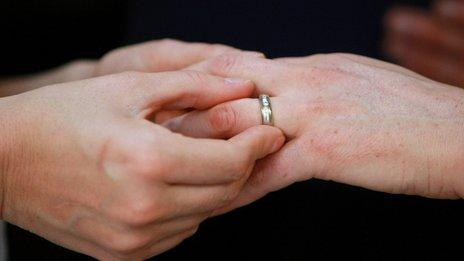
- Published27 March 2014
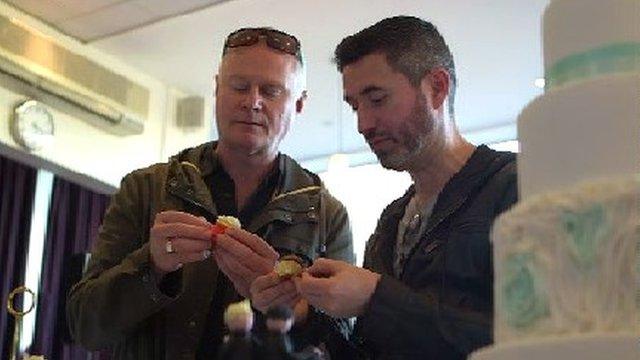
- Published26 March 2014
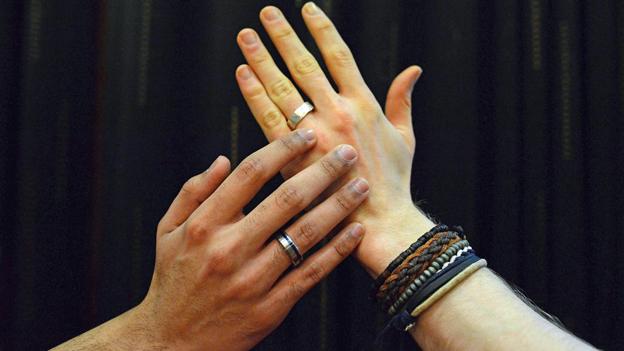
- Published27 March 2014
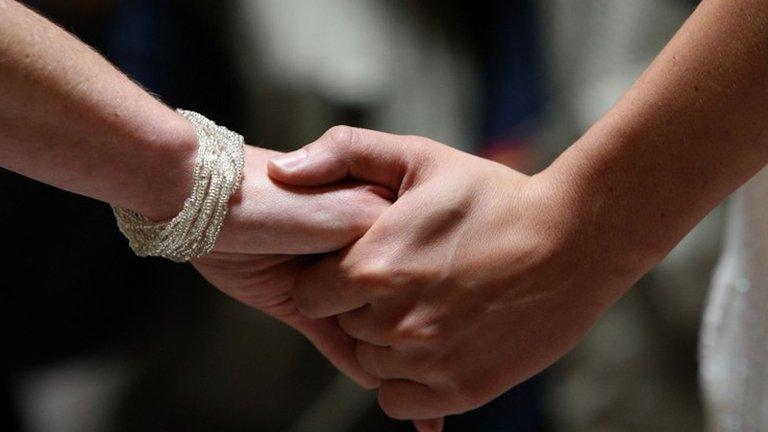
- Published17 July 2013
